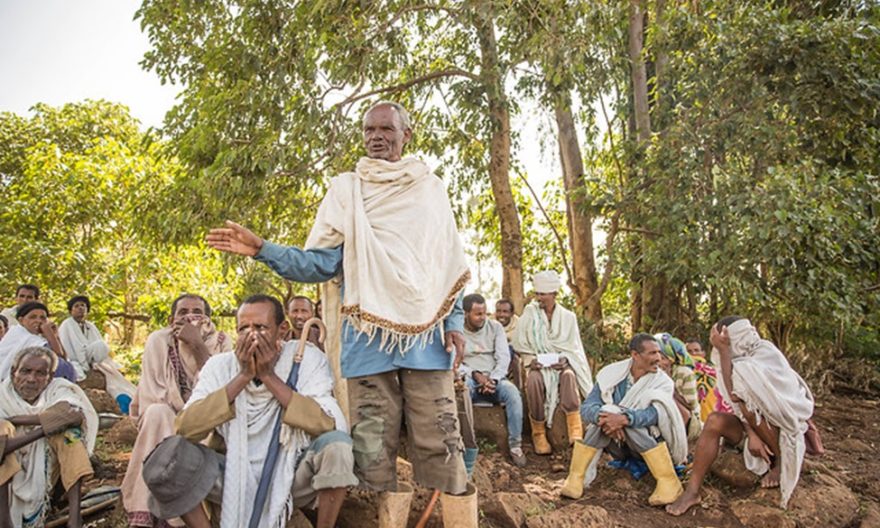
Human beings acquire their sense of self and personal traits mainly from their family and the society around them. Scholars say that each of us has our own sense of identity derived from personal and family background, as well as our sense of community heritage and culture.
This identity is limited in its demarcation, as the number and interests of humans cannot be managed in a specific place, leading people to live in different and scattered geographical settings. When this happens, the ties they had with a specific group can no longer be maintained.
Since the chance to frequently meet and interact with each other is interrupted due to spatial separation, they begin creating their own way of life that is suited to their context. In this way, they gradually become a different social group with a unique identity. However, as they are human beings, the way of life they specifically design for themselves has humanistic elements.
Sociologists argue that while human beings have created many solutions to various challenges, human-related issues are still complex and cannot be solved solely through technological advancements.
Dr. Keith Vernon, a principal lecturer in History at the University of Central Lancashire, stated, “Technical fixes cannot solve human problems, as ultimately our difficulties come down to how people relate to each other, how we see ourselves, and how we see others.”
In Ethiopia, more than 85 nations and nationalities reside in harmony. Each national has their own cultural identity and language, which sets them apart from others while also sharing some cultural practices. Within these cultural practices, the values of humanity, honesty, love, respect, generosity, truthfulness, and hard work are presented in various intensities and styles. These values are not specific to any one group or nation but are universal human necessities.
The scholar noted that the world is full of wonderful diversity, meant to unite humans at some point. However, sometimes, instead of appreciating and benefiting from these diverse identities, some cultures may be distorted and abused for political or other advantages.
This cultural distortion can be portrayed through language, dress, way of life, and other cultural demonstrations. The Ethiopian Herald interviewed Mulugeta Ayele (PhD), an instructor and researcher at the Department of Peace and Security at Addis Ababa University. He mentioned that in Ethiopia, there has been a distorted narrative shown through the proverbs and folklore of certain social groups.
The culture may contain negative or unwelcome expressions in its language, which can be powerful in dividing society and eroding national unity. Therefore, revising the culture in a way that includes all social groups is crucial for creating national consensus.
Keith expressed this idea as follows: “Our sense of belonging and identity is misused to divide people and communities.” Historical evidence is often manipulated to create false narratives, religions, beliefs, and cultures that create barriers and suspicion. This ‘Us and Them’ ideology pits humanity against itself, making resource sharing difficult.
Dr. Yonas, in an exclusive interview with the Ethiopian Herald, noted that Ethiopia has many cultural practices and customs that promote togetherness, dialogue, negotiation, and compromise. The people have experience in their social classes, making them cautious and willing to discuss issues with minimal effort. However, these cultures have not been fully utilized yet. Scholars argue that the humanistic element is crucial for sustaining harmony more than our differences.
To illustrate this point, let us consider the culture of the Northern Ethiopian people known as Shimglina, which plainly means elderliness, symbolizes dispute solution by elderly persons. In this culture, when a wrongdoing occurs within a community, the case is brought before a group of elders called Shimagles. Both the victim and the perpetrator sit opposite each other in front of the elders without raising any quarrel. The elders listen to the story calmly, balance the accounts, reprimand the criminal, and ask the victim to forgive his brother and continue as before.
Compensation is determined based on the severity of the offense. This fair process ensures that no further disputes arise, solving the case peacefully. Similar cultural practices exist in other societies, each with their unique approach.
In modern human science and interaction studies, there is a growing emphasis on examining the culture and history of societies to understand their true identity and aspirations. Keith emphasized that questions of heritage, culture, and identity are central to humanities disciplines.
Mulugeta believed that Ethiopia has pragmatic cultural practices that facilitate mediation and negotiation in various issues. Elders, religious leaders, and public figures who understand society well can mobilize people effectively. By identifying and capitalizing on cultures that promote negotiation and compromise, national consensus can be achieved naturally.
Keith argued that by analyzing evidence accurately, constructing reasoned arguments, and understanding complex issues, humanities disciplines teach us how to appreciate differences and learn from each other through respectful debate. Through celebrating differences and recognizing commonalities, humanity can bridge divides and create a better future.
Examining people’s identities through their culture and history is a fruitful way to find their humanistic qualities. Culture reflects the soul of humanity and can lead to a sense of national identity and consensus on controversial issues. By valuing cultural practices that unite us, we can boost our nationality positively. Let us embrace our cultural values to solve our own problems and celebrate what brings us together as humans.
BY MEKDES TAYE (PhD)
The Ethiopian Herald December 25/2024



